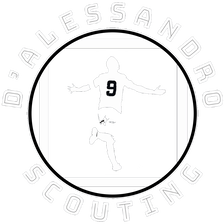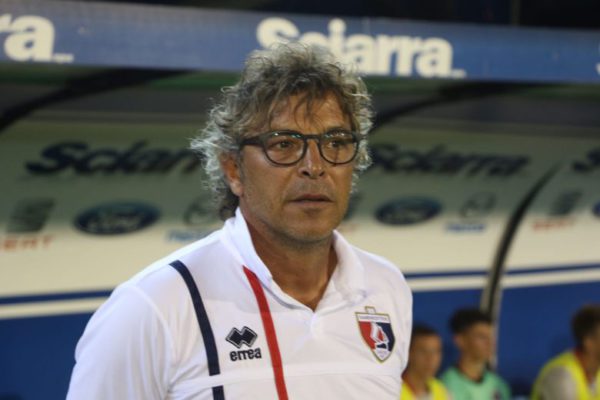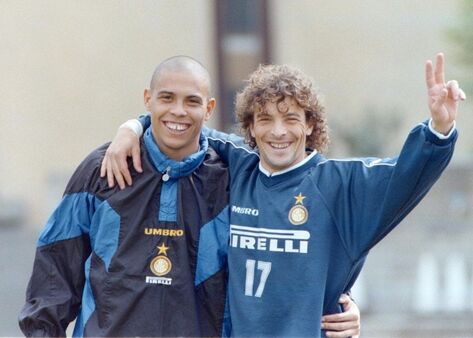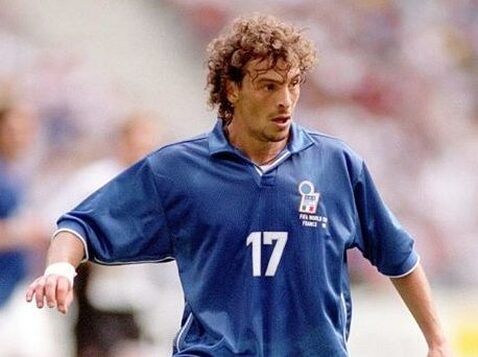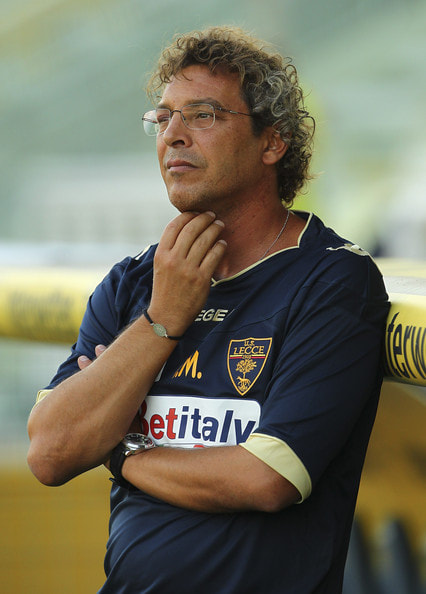FRANCESCO MORIERO
Report date: 30/10/2019
|
BASIC INFORMATIONS
Name: Francesco Surname: Moriero Date Of Birth: 31/03/1969 Place Of Birth: Lecce, Italy Nationality: Italy Occupation: Head Coach Club: Last Club: Cavese 1919 (Italian Serie C) PLAYER CAREER
Francesco "Checco" Moriero is a retired Italian football player and current manager, who played as a midfielder, usually as a winger on the right flank. Throughout his career, he played for several Italian Clubs: Lecce, Cagliari, Roma, Inter Milan, and Napoli, winning an UEFA Cup title with Inter in 1998. A former Italy international, he took part at the 1998 FIFA World Cup.
Originally from Lecce, he began his career with the local club's youth side, making his professional debut with the senior Lecce side during the 1986–87 Serie B season. The following season, he made 35 appearances, scoring 3 goals, helping the team to gain promotion to Serie A. He played two seasons in Serie A with Lecce, making 86 appearances and scoring 4 goals, before Lecce were relegated to Serie B once again. During the 1991–92 Serie B season, he set a personal best of 6 goals in 34 appearances, before moving to Cagliari in 1992, where he made his debut in European competitions, notably helping the team to reach the semi-final of the 1993–94 UEFA Cup. In 1994, he moved to Roma for 8.5 billion Lit. He spent 3 seasons with the club, becoming an important figure, making 75 appearances in Serie A, and scoring 8 goals. In May 1997, he had initially made a deal to sign for Milan, but in July, he signed with Inter for 1 million Lit. in an exchange between the two Milan clubs involving André Cruz, who was initially about to sign a contract with Inter. He made his debut with Inter on the first matchday of the 1997–98 Serie A season, on 31 August 1997, against Brescia, at the Giuseppe Meazza Stadium. His most notable and successful career spell came with the Milan club, and in his first season, he won the 1997–98 UEFA Cup under manager Luigi Simoni, notably scoring a goal from a bicycle kick against the Swiss team Neuchatel Xamax during the tournament. Inter also narrowly missed out on the Serie A title to Juventus that season, as Moriero made 28 league appearances that season, scoring 3 goals. Although he made fewer appearances during the next two seasons due to injury (making 28 appearances in Serie A in total, scoring 3 goals), he also later reached the 2000 Coppa Italia final with the club, under Marcello Lippi, before moving to Napoli in 2000. During the 2000–01 Serie A season, he made 14 appearances with Napoli, scoring a goal, although he was unable to save the club from relegation. He ended his career with the club in 2002, in Serie B. In total he made 287 appearances in Serie A, scoring 21 goals. After making an appearance with the Italy national under-21 football team in a 1–0 win over Greece on 7 February 1990, under manager Cesare Maldini, Moriero also played for the senior Italian national team; in total, he scored two goals in eight matches for Italy between 1998 and 1999. He made his senior international debut on 28 January 1998, in a 3–0 home win over Slovakia, providing two assists during the match; in his next appearance, in an international friendly against Paraguay on 22 April 1998, he scored his only two goals for Italy, one from a bicycle kick, as they won the match 3–1 at home. Moriero was a participant for Italy at the 1998 FIFA World Cup, under Cesare Maldini once again, where Italy were eliminated in the quarterfinals to hosts and eventual champions France on penalties. Although he was often alternated with the more defensive-minded Angelo Di Livio on the right wing, he still appeared in all five of Italy's matches during the tournament, and he assisted Christian Vieri's first goal in Italy's 3–0 win against Cameroon in their second group stage match, also starting the play for his second goal of the match. He also combined with Filippo Inzaghi to initiate the play which led to Roberto Baggio's match winning goal against Austria in Italy's final group match, as Italy won 2–1 to top their group. He made his final appearance for Italy on 9 October the following year, in a European qualifier against Belarus, under manager Dino Zoff, which ended in a 0–0 away draw. STYLE OF PLAY
Moriero was a right-footed, quick, diminutive, energetic, and highly technical midfielder, who was predominantly used as right winger; although he was primarily an offensive minded player, with a penchant for making attacking runs, and who was even used as an outside forward on occasion, he was also known for his work-rate, tactical intelligence, and defensive contribution off the ball, as well as his ability to track back, which enabled him to cover the flank effectively. Moriero's main attributes were his acceleration, pace, dribbling skills, agility, flair, and creativity; these characteristics enabled him to beat opponents in one on one situations, get up the wing, and provide width to his team by overloading the flanks, giving his team a numerical advantage when attacking. He was also known for his ability to create chances and provide assists for strikers with his crossing ability and long balls from the right flank. He also had good vision and distribution, as well as a penchant for scoring with spectacular strikes from distance, or acrobatic goals from volleys and bicycle kicks. Regarded as one of the best wingers of his generation, during his prime, his world class performances, characteristics, playing style, and position on the pitch earned him comparisons with esteemed former Italian wingers Franco Causio, Bruno Conti, and Roberto Donadoni, as well as Portuguese winger Luís Figo. However, despite his talent, Moriero also garnered a reputation for being inconsistent at times. In addition to his skills and playing ability, Moriero was also known for his trademark celebration, which involved him pretending to polish his team-mates' football boots whenever they scored a goal.
Clubs
1985-92: Lecce, Serie B/A (158 apparences - 11 goals) 1992-94: Cagliari Serie A (54 apparences 4 goals) 1994-97: Roma Serie A (76 apparences 8 goals) 1997-00: Inter Serie A (56 apparences 6 goals) Won UEFA CUP 1997-1998 2000-02: Napoli Serie A/B (24 apparences 1 goal) National Team 1998-1999: Italy (8 apparences 2 goals) |
FULL MATCH
23/05/2018 - Sambenedettese - Piacenza (Italian Serie C) Mr. Moriero was coaching on Sambenedettese side (Red and Blue shirts)
HEAD COACH CAREER
2006-07: Africa Sports (Ivory Coast/Ligue 1) WINNER
2007-08: Lanciano (Italy/Serie C) 2008-09: Crotone (Italy/Seire C) 2009-10: Frosinone (Italy/Serie B) 2010-11: Grosseto (Italy/Serie B) 2011-12: Lugano (Switzerland/Challenge League) 2012-13: Grosseto (Italy/Serie B) 2013-14: Lecce (Italy/Serie C) 2014-15: Catanzaro (Italy/Serie C) 2015-16: Catania (Italy/Serie C) 2017-18: Sambenedettese (Italy/Serie C) 2019-20: Cavese (Italy/Serie C) COACHING STYLE
"My football thinking is based on work, organization and the will to play an offensive game. The basis must be: respect for the
rules, organization and tactical flexibility. In my career as a coach I had the chance to experiment the game with many different tactics: 4-2-3-1, 4-4-2, 3-4-3, 4-3-1-2, 4-3-3. I've coached with those lineups without ever lose the intention of play an offensive game. I like that my teams play a beautiful game and to do that I work a lot on the tactical side of both phases (offensive and difensive). I want to build a strong team organization and at the same time a positive mentality in the group. I believe that if a team plays well and has its own style of play it will be easier to win the games. My team must always try to play football without having fear. For example, I always want that my players move with the ball from the defense without having fear of doing it (fundamental moment of the game in my way of seeing football). My team's game must start from behind with the defensive line and with a quick turn of the ball, with the help of midfielders trying to develop a harmonious game, I want my players to show their individual creativity, their offensive characteristics and their talent. Another fundamental aspect is the physical preparation and working method during the pre and half season (summer and winter): I want an intense job with the ball and without, useful to equip the team with temperament, character and aggressiveness; fundamental concepts for my football. The work is structured to give players the ability to propose precise movements without the ball depending on the different game situations that can develop during the play. It is necessary to transmit to footballer the importance of knowing how to make their initiatives available to the team. We also need to know how to use the individual qualities of each players. It is necessary to understand that we can make mistakes and therefore it is necessary to have the ability to accept a possible error or failure without let yourself be negatively conditioned. A positive Football needs unity of purpose, desire to win and determination in pursuing the set goals, both on and off the field. Attention and synergic work leads to developing an offensive mentality, studying the phase of possession and stimulating it adequately during the development. We need a lot of care in the construction of the game, the finalization phase, the reading of the play and the uses of the spaces, the speed of the execution, the speed of movements off the ball and of the players intensity during the action." KEY WORDS
-CREATE aN UNIQUE THINKING IN THE TEAM
| ||
| mr._moriero_pensiero_e_metodologia.pdf |
Highlights of Lecce - Frosinone (Serie B 2009/10). Mr. Moriero was coaching Frosinone side on White shirt.
Highlights of Salernitana - Frosinone (Serie B 2009/10). Mr. Moriero was coaching Frosinone side on Yellow shirt.
